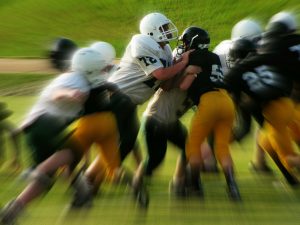27 Oct Recognizing the Signs of a Concussion
 It’s back to the gridiron! The start of the new school year unofficially marks the end of summer, and in the South that only means one thing: It’s time to play some football! As local high school teams prepare for the upcoming football season, athletes, parents, and coaches must continue to stay vigilant in order to prevent injuries from overexertion and learn about head concussion symptoms. When a football player suffers a concussion during a game or practice, it’s serious business!
It’s back to the gridiron! The start of the new school year unofficially marks the end of summer, and in the South that only means one thing: It’s time to play some football! As local high school teams prepare for the upcoming football season, athletes, parents, and coaches must continue to stay vigilant in order to prevent injuries from overexertion and learn about head concussion symptoms. When a football player suffers a concussion during a game or practice, it’s serious business!
Research shows that athletes who have repeated concussions are more likely to get long-term brain damage and could even develop a condition that mimics dementia called chronic traumatic encephalopathy or CTE. Helmets do help prevent skull fractures, but not head injuries, which is why it is very important to know head concussion symptoms. A concussion occurs when the brain shakes so forcefully that it hits the side of the skull and becomes injured. So, until we learn how to strap the brain down inside the skull, the risk of concussion will continue to be a real risk for football players. Now, what are signs of a concussion?
Recognizing the signs of concussion is the first step in protecting our young athletes. Symptoms of a concussion can include:
- Loss of consciousness
- Drowsiness
- Confusion
- Headache
- Nausea or vomiting
- Blurred vision
- Loss of memory of the events surrounding the injury
A concussion that leaves an athlete concussion for several minutes is obviously serious, but even a mild concussion can do tremendous damage. If an athlete is suspected to have a concussion, he/she should be checked by a doctor before being allowed to practice or play again.
Do you have a young athlete that currently has to sit the game out because of injury? Give us a call at (662) 282-4949. Physical therapy help help them recover from an injury getting them back on the field sooner and avoid future injury to help them stay on the field.



Sorry, the comment form is closed at this time.